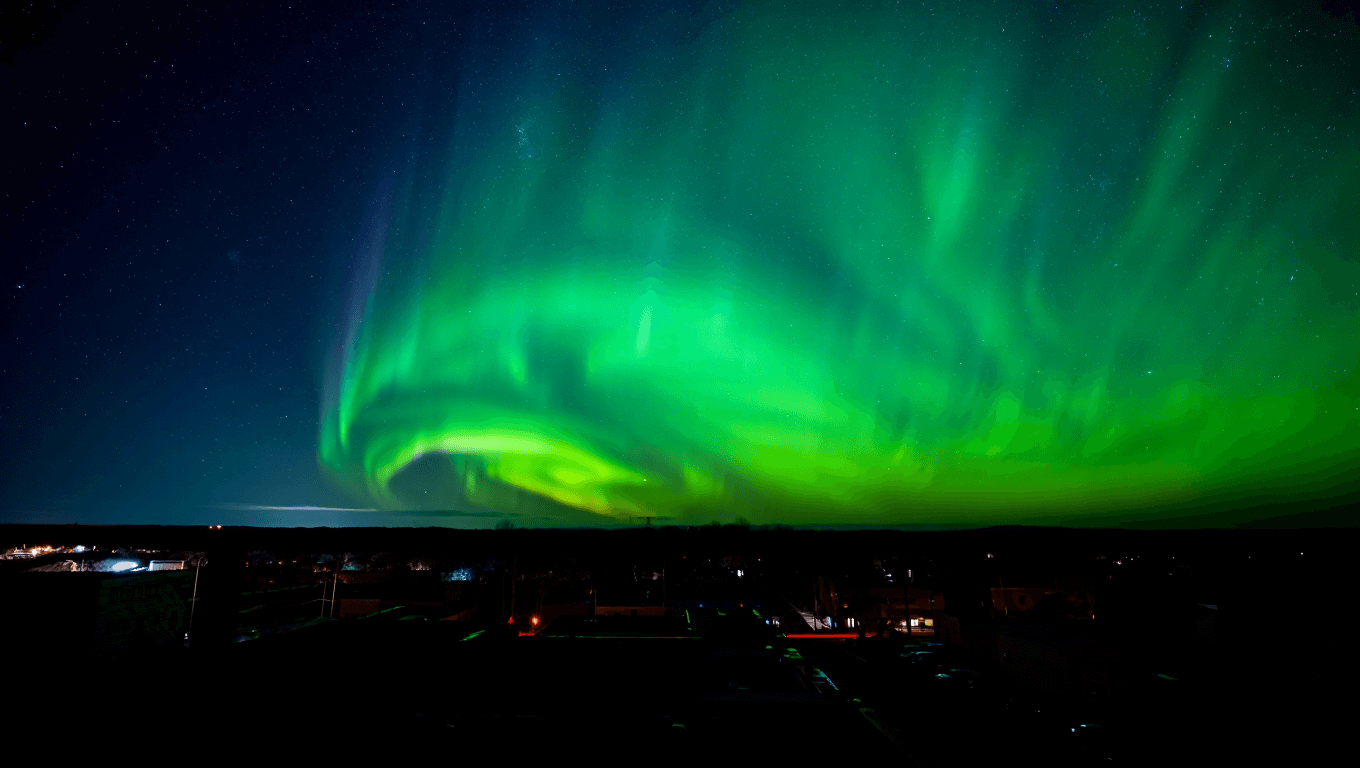The northern lights are painting Omaha skies tonight. A rare G4 geomagnetic storm hit at 8:20 PM EST on Nov. 12. This severe solar event brings the aurora much farther south. Stargazers across 21 U.S. states can witness this naturally beautiful cosmic display.
Kara Brown loses Jeopardy thriller, stumped by Harper Lee clue in dramatic final
Kara Brown loses Jeopardy thriller to Harrison Whitaker, all three contestants stumped by Final question
🔥 Quick Facts:
- G4 Severe geomagnetic storm reached Earth on Nov. 12, 2025 at 8:20 PM EST
- Northern lights now visible from Alaska to Indiana and beyond
- Best viewing time: 10 PM to 2 AM local time
- Omaha, Nebraska confirmed seeing aurora borealis displays tonight
- Storm continues through Wednesday/Thursday with moderate activity expected
What Triggered This Rare Aurora Display
A powerful coronal mass ejection (CME) erupted from the sun. This solar flare sent charged particles racing toward Earth at incredible speeds. NOAA upgraded the geomagnetic storm watch after detecting this massive solar activity on Tuesday, Nov. 11.
Jasleen Singh fires back at podcast critics, calls out ‘cockroaches’ in viral controversy
Aakash Singh’s wife Jasleen fires back at online drama, defends podcast past
The sun is currently in a peak activity phase. 2025 marks an exceptional year for solar storms. When solar particles breach Earth’s magnetosphere, they collide with oxygen and nitrogen in our upper atmosphere. These collisions produce the shimmering green, red, and purple light shows we see as auroras.
“A G4 (Severe) storm level reached on 12 November at 0120 UTC (8:20pm EST)! Geomagnetic storm conditions are anticipated to continue.”
Omaha residents captured stunning photos on social media. Posts showed vivid green aurora displays visible from the city limits. This first-time viewing opportunity delighted astronomy enthusiasts and casual observers alike.
How to Catch the Aurora Tonight in Omaha
Head north away from city lights immediately. The best viewing happens between 10 PM and 2 AM tonight. Find a dark location with an unobstructed view toward the northern horizon. NOAA recommends patience—auroras often appear faint initially, then intensify in waves.
No special equipment needed to see the lights. Bring warm clothing since November nights are cold in Nebraska. A smartphone camera works, but adjusting settings helps capture the display. Use manual mode, set ISO to 1600-3200, and keep your shutter open for 10-15 seconds.
Check NOAA’s official aurora viewline map for real-time forecasts. The map shows exactly where auroras are visible right now. Thursday night may offer additional viewing opportunities as storm conditions persist.
Aurora Viewing Details for Your Location
The G4 storm is pushing aurora displays farther south than normal. Typically, auroras appear only in Alaska, Canada, and northern U.S. states. Tonight’s severe geomagnetic storm extends viewing to states like Nebraska, Iowa, and even further south.
| Storm Category | G4 (Severe) |
| Peak Time | Nov. 12, 8:20 PM EST onward |
| Best Viewing Hours | 10 PM to 2 AM local time |
| Visible Regions | 21 U.S. states from Alaska to Indiana |
| Omaha Visibility | Strong potential all night long |
| Continued Activity | Wed-Thu with moderate to strong conditions |
A G4 geomagnetic storm is exceptionally strong. On the 1-5 scale used by NOAA, G4 ranks as severe. G5 storms are rarer and require extreme solar activity. Tonight’s display represents a significant celestial event.
What To Watch For In The Coming Hours
- Wave patterns: Aurora displays often come in waves. A faint glow might suddenly burst into vivid colors.
- Color variations: Green is most common, but look for red and purple hues at extreme altitudes.
- Duration: Watch parties can last several hours as the storm continues peak intensity.
- Weather conditions: Clear skies are essential. Check forecasts to avoid cloud cover.
- Next night: Aurora chances remain good through Thursday night with slightly lower intensity expected.
Will You Catch This Rare Celestial Show?
Missing Omaha‘s northern lights tonight means waiting years for another chance. Solar maximum peaks roughly every 11 years. 2025 happens to be near the current peak.
Thursday night offers a backup window. The geomagnetic storm persists with G2 to G3 intensity predicted for tomorrow. Conditions will weaken but remain viewable. That second night may offer less dramatic displays, but still remarkable.
Thousands of Omaha residents are already heading outside. Social media erupts with aurora photos. News stations feature live weather updates tracking the storm’s intensity. This shared experience unites the community in wonder.
Will you bundle up and witness the aurora tonight? The cosmic display won’t wait long. Step outside, look north, and let your eyes adjust to the darkness. The show is happening right now above Omaha. Don’t miss it.
Watch NASA’s explanation of how geomagnetic storms create auroras:

Sources
- NOAA Space Weather Prediction Center – Official G4 geomagnetic storm alert and aurora viewline forecasts
- Fox Weather – Northern lights visibility across U.S. states November 12, 2025
- NBC Chicago – Severe geomagnetic storm impact on Midwest aurora viewing

Daniel Harris is a specialist journalist focused on the crossroads of breaking news, extraordinary history, and enduring legends. With a background in historical research and storytelling, he blends timely reporting with timeless narratives, making complex events and ancient myths resonate with today’s readers. Daniel’s work often uncovers surprising links between present-day headlines and legendary tales, offering unique perspectives that captivate diverse audiences. Beyond reporting, he is passionate about preserving oral traditions and exploring how extraordinary stories continue to shape culture and identity.

